

Socially Responsible Investing. You need to take two passes over your portfolio.
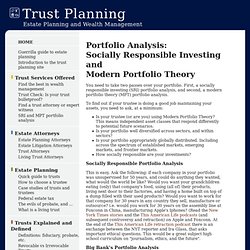
First, a socially responsible investing (SRI) portfolio analysis, and second, a modern portfolio theory (MPT) portfolio analysis. To find out if your trustee is doing a good job maintaining your assets, you need to ask, at a minimum: Is your trustee (or are you) using Modern Portfolio Theory? This means independent asset classes that respond differently to potential future scenarios. Is your portfolio well diversified across sectors, and within sectors? Socially Responsible Portfolio Analysis This is easy. Big Bank's Portfolio Analysis Banks are taking out ads offering to analyze your portfolio. Basically you need a low-to-no-leverage portfolio (no borrowing to buy; that's what got the investment banks in trouble in the 2008 collapse).
The cutting edge of Modern Portfolio Theory (MPT) Socially Responsible Investing. Very few big banks will manage a trust fund with social responsibility in mind.
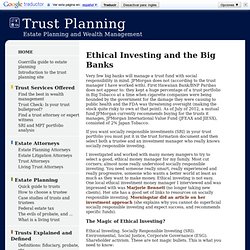
JPMorgan does not (according to the trust manager I have worked with). First Hawaiian Bank/BNP Paribas does not appear to: they kept a huge percentage of a trust portfolio in Big Tobacco at a time when cigarette companies were being hounded by the government for the damage they were causing to public health and the FDA was threatening oversight (making the stock quite risky to own at that point). As of July of 2012, a mutual fund JPMorgan currently recommends buying for the trusts it manages, JPMorgan International Value Fund (JFEAX and JIESX), consisted of 2% Japan Tobacco.
Social Justice Metrics. College Students Drive SRI Efforts. They may be living on pizza and shoestring budgets, but a growing number of college students are trying to steer their universities' billion-dollar endowments and Corporate America towards social responsibility.

Students at 39 U.S. schools have established Committees on Investor Responsibility and Yale University undergraduates are managing a socially responsible endowment fund. A number of factors have helped pique and tweak collegians' interest in socially responsible investing since their initial efforts on campuses in the 1970s. The explosion in endowment assets--universities and colleges nationwide now control over $400 billion--has given schools a louder voice in the investment community.
They've amassed these assets by embracing a new model of endowment investing over the past two decades that's introduced them to riskier, less liquid assets including hedge funds and private equity. "The goals for the fund are educational, financial and social. Social Investment Organization. Socially responsible investing. Socially responsible investing (SRI), also known as sustainable, socially conscious, "green" or ethical investing, is any investment strategy which seeks to consider both financial return and social good.
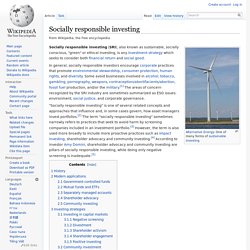
"Socially responsible investing" is one of several related concepts and approaches that influence and, in some cases govern, how asset managers invest portfolios.[2] The term "socially responsible investing" sometimes narrowly refers to practices that seek to avoid harm by screening companies included in an investment portfolio.[3] However, the term is also used more broadly to include more proactive practices such as impact investing, shareholder advocacy and community investing.[4] According to investor Amy Domini, shareholder advocacy and community investing are pillars of socially responsible investing, while doing only negative screening is inadequate.[5] History[edit] The origins of socially responsible investing may date back to the Religious Society of Friends (Quakers).
Corporate Social Responsibility. What is Corporate Social Responsibility?
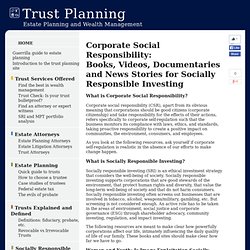
Corporate social responsibility (CSR), apart from its obvious meaning that corporations should be good citizens (corporate citizenship) and take responsibility for the effects of their actions, refers specifically to corporate self-regulation such that the business monitors its compliance with laws, ethics, and standards, taking proactive responsibility to create a positive impact on communities, the environment, consumers, and employees. As you look at the following resources, ask yourself if corporate self-regulation is realistic in the absence of our efforts to make change happen.
What is Socially Responsible Investing? Socially responsible investing (SRI) is an ethical investment strategy that considers the well-being of society. Socially responsible investing supports corporations that are good stewards of the environment, that protect human rights and diversity, that value the long-term well-being of society and that do not harm consumers. Conscience Driven Investing - Northern Trust. Socially Responsible Investment (SRI) is an investment strategy that incorporates environmental, social and corporate governance (ESG) factors within the investment process.
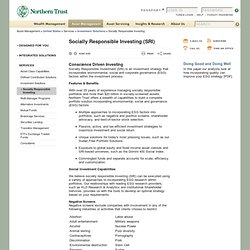
Features & Benefits With over 25 years of experience managing socially responsible portfolios and more than $20 billion in socially-screened assets, Northern Trust offers a breadth of capabilities to build a complete portfolio solution incorporating environmental, social and governance (ESG) factors: Social Investment Capabilities We believe socially responsible investing (SRI) can be executed using a variety of approaches to incorporating ESG research within portfolios. Our relationships with leading ESG research providers, such as KLD Research & Analytics and Institutional Shareholder Services, provides us with the tools to develop an optimal strategy based on your requirements. Best-of-Sector Stock SelectionThis approach selects companies with the highest ESG record relative to sector peers.